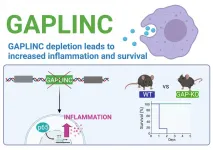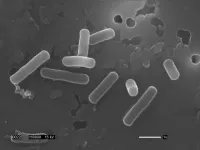Latest review shows intensive care mortality from COVID-19 continued to fall in 2020, but improvement is slowing
2021-02-02
(Press-News.org) A meta-analysis of global studies published in Anaesthesia (a journal of the Association of Anaesthetists) shows that intensive care morality from COVID-19 has continued to fall since the start of the pandemic, but the improvement is slowing and may have plateaued. The study is by Professor Tim Cook (Consultant in Anaesthesia and Intensive Care Medicine, Royal United Hospitals Bath NHS Foundation Trust, Bath, UK, and Honorary Professor, School of Medicine, University of Bristol, UK) and colleagues.
A previous meta-analysis* by Cook and colleagues, published in July, 2020, concluded that overall mortality of COVID-19 patients in intensive care units (ICUs) has fallen from almost 60% at the end of March 2020 to 42% at the end of May 2020 -- a relative decrease of around one third. This new study shows that, in studies up to October, 2020, ICU mortality has fallen again to 36%. Thus, while the situation is still improving, the pace of progress has slowed substantially.
In this study, the authors used data from 52 observational studies including 43,128 patients, and, in addition to studies from Europe, North America and China that had been included in the earlier review, this study included first reports from the Middle East, South Asia and Australia, as well as four new national or regional registries.
The authors explain that, in the last few months, several studies have clarified which treatments do and do not provide benefit in the ICU management of COVID-19. Steroids (particularly dexamethasone) were shown in early June to improve survival in patients who are oxygen-dependent or receiving mechanical respiratory support, while other drugs including hydroxychloroquine, azithromycin, lopinavir/ritonavir and remdesivir have been shown to have no clear mortality benefit. They also note that management of COVID-19 has also likely evolved over the year with changes in approaches to oxygen therapy, fluid therapy and management of blood clotting.
The data show that in most geographical regions the ICU mortality rate from COVID-19 is 30- 40%. Two geographical regions fall outside these limits and are statistically significantly different from other geographical regions. A single registry report from Victoria State in Australia (home to the city of Melbourne) reports very low mortality of 11%. Conversely in the Middle East, mortality from a study including four countries is high at 62%. There are several potential explanations for this finding, including the fact that studies from the Middle East included patients early in the pandemic when mortality was higher, while the patients included in Australia were later in the pandemic when mortality was lower.
The authors comment that the analysis is limited by the fact that there is no global standardisation of what constitutes intensive care, entry criteria for patients, admitted patients' underlying health characteristics and severity of critical illness, or reporting on the nature or intensity of treatments. Thus direct comparisons between studies from different regions can be difficult.
The authors say: "Our analysis includes studies published only up to October 2020. Since then, several variant viruses have emerged and in some countries transformed the trajectory of the pandemic through December 2020 and into January 2021. This has increased the demand on ICU in those locations and will merit further analysis in due course. To counter this, vaccination is now available in many countries and we can hope that this will also, over several months, positively impact on the pandemic trajectory and demand on ICU care."
They conclude: "After our first meta-analysis last year showed a large drop in ICU mortality from COVID-19 from March to May 2020, this updated analysis shows that any fall in mortality rate between June and October 2020 appears to have flattened or plateaued."
INFORMATION:
ELSE PRESS RELEASES FROM THIS DATE:
2021-02-02
New research reveals that the COVID-19 intensive care (ICU) mortality rate in Sweden was lower during the first wave of the pandemic than in many studies from other countries. And while analysis of individual underlying conditions found they were linked to mortality, an analysis looking at all these variables together found COVID-19 mortality in intensive care was not associated with underlying conditions, except for chronic lung disease. This new study did, however, find that, like previous research, mortality was driven by age, severity of COVID-19 disease and the presence and ...
2021-02-02
Astronomers from the ARC Centre of Excellence for Gravitational Wave Discovery (OzGrav) and CSIRO have just observed bizarre, never-seen-before behaviour from a 'radio-loud' magnetar--a rare type of neutron star and one of the strongest magnets in the Universe.
Their new findings, published today in the Monthly Notices of the Royal Astronomical Society (MNRAS), suggest magnetars have more complex magnetic fields than previously thought - which may challenge theories of how they are born and evolve over time.
Magnetars are a rare type of rotating neutron star with some of the most powerful magnetic fields in the Universe. Astronomers have detected only thirty of these objects in and around the Milky ...
2021-02-02
HOUSTON-(Feb. 1, 2021) - Houston Methodist researchers have developed a mathematical model to predict how specific cancers will respond to immunotherapy treatments, thus enhancing chances for successful treatments from a wide variety of cancer-immunotherapy drug combinations. The results were published last month in Nature Biomedical Engineering in collaboration with researchers at MD Anderson Cancer Center.
Immunotherapy activates patients' immune systems to recognize and attack their cancers, leading to higher, more targeted kill rates and fewer side effects than chemotherapy, radiation and other therapies. While this technology is a significant advance in fighting cancer, it works only with some cancer ...
2021-02-02
Oak Brook, IL - The February edition of SLAS Discovery is a Special Issue on Hit Discovery Methodologies edited by Mark Wigglesworth, Ph.D., (Medicines Discovery Catapult, Stockport, EN, UK) and Peter Hodder, Ph.D. (Amgen, Thousand Oaks, CA, USA).
The focus of this Special Issue is to highlight the use of hit discovery methodologies and technologies and their usage in both small molecule and large molecule drug discovery. The February issue exemplifies how technologies, both new and existing, have been applied successfully to find hits.
Additionally, the issue houses a list of the most downloaded articles from SLAS journals, many of which ...
2021-02-02
Las Vegas, Nev. (Monday, Feb. 1, 2021) - In the summer of 2019, Desert Research Institute (DRI) scientist Rosemary Carroll, Ph.D., waited for the arrival of the North American Monsoon, which normally brings a needed dose of summer moisture to the area where she lives in Crested Butte, Colo. - but for the fourth year in a row, the rains never really came.
"2019 had just a horrendous monsoon," Carroll said. "Just the weakest monsoon. And we'd had a few years of weak monsoons before that, which had really gotten me wondering, how important is the monsoon to late summer streamflow here in the Upper Colorado River basin? And how do monsoons influence the following year's streamflow?"
Working in partnership with colleagues ...
2021-02-02
Oak Brook, IL - The February edition of SLAS Technology is a special collection of articles focused on "Artificial Intelligence in Process Automation" by Guest Editor Cenk Ündey, Ph.D. (Amgen, Thousand Oaks, CA, USA).
This SLAS Technology special collection targets the use of artificial intelligence (AI) techniques and technologies as applied specifically to drug discovery, automated gene editing and machine learning. As AI becomes increasingly more prevalent in research, medicine and even everyday life, laboratory automation has gone beyond hardware advancements toward new levels ...
2021-02-01
Risk for a severe form of retinopathy of prematurity, which can cause blindness in extremely premature babies, was halved when the newborns were given a new supplement combining various fatty acids. This was shown in a Swedish study led from the University of Gothenburg.
The study, now published in JAMA Pediatrics, is described as groundbreaking in its field. It documents a clear fall in retinopathy of prematurity (ROP) among extremely premature (EP) infants (born before 28 weeks' gestation), whose retinal blood vessels are not fully developed. The condition can cause ...
2021-02-01
When the body's immune response to an infection gets out of control, the result can be sepsis, a life-threatening condition in which an overwhelming inflammatory response can lead rapidly to failure of multiple organs and death.
In a new study, researchers at UC Santa Cruz have identified a long noncoding RNA (lncRNA) molecule that regulates the expression of pro-inflammatory genes in immune system cells called macrophages and affects the susceptibility of mice to septic shock.
This lncRNA, called GAPLINC, was previously studied for its role in cancer, but it turns out to be the most highly expressed lncRNA in macrophages, which play a central role in inflammation. ...
2021-02-01
A previously unknown root trait allows some cereal plants to grow deeper roots capable of punching through dry, hard, compacted soils, according to Penn State researchers, who suggest that harnessing the inherited characteristic could lead to crops better able to deal with a changing climate.
"This discovery bodes well for American and global agriculture because the trait helps corn, wheat and barley grow deeper roots, which is important for drought tolerance, nitrogen efficiency and carbon sequestration," said Jonathan Lynch, distinguished professor in plant science. "Breeding for this trait should be helpful in developing new crops for climate mitigation."
Called multiseriate cortical sclerenchyma by the researchers -- or MCS -- the phenotype is ...
2021-02-01
New research from North Carolina State University reveals that probiotic Lactobacillus bacteria use enzymes situationally to manipulate bile acids and promote their own survival in the gut. These findings further elucidate the complicated relationship between bile acids and gut bacteria and could eventually enable researchers to design lactobacilli with therapeutic properties, thereby engineering a healthier human gut environment.
Bile acids are key players in digestion and overall gut health. Produced in the liver and released after we eat, these acids not ...
LAST 30 PRESS RELEASES:
[Press-News.org] Latest review shows intensive care mortality from COVID-19 continued to fall in 2020, but improvement is slowing





